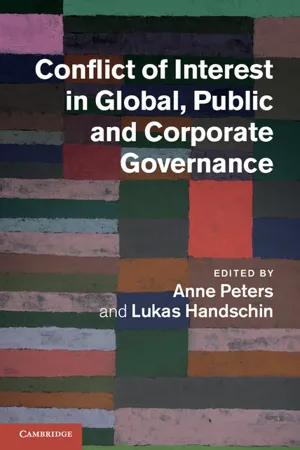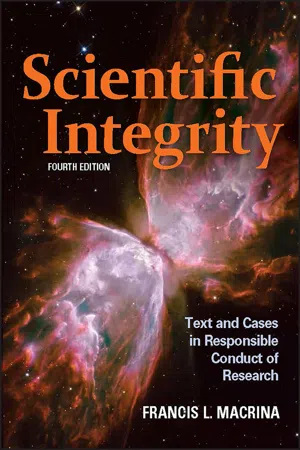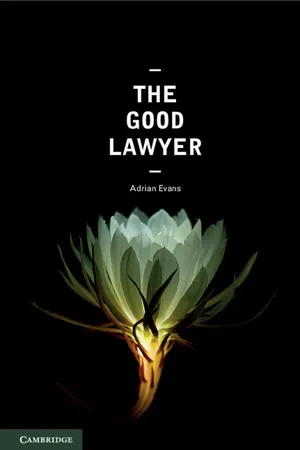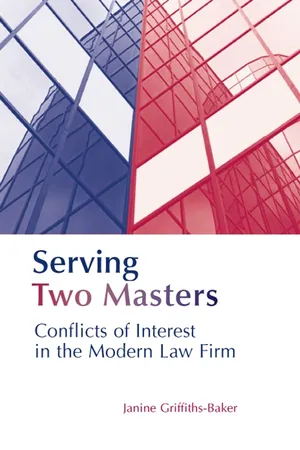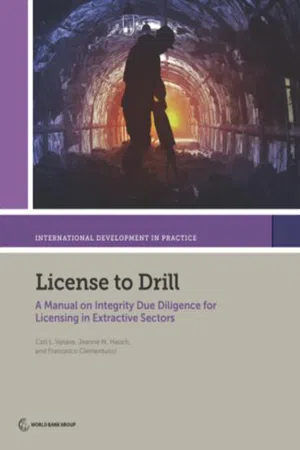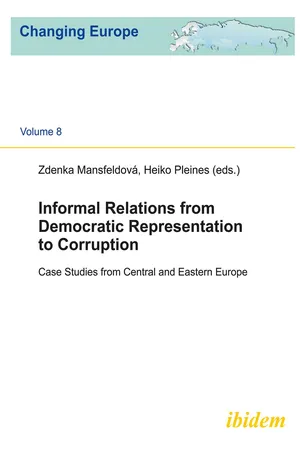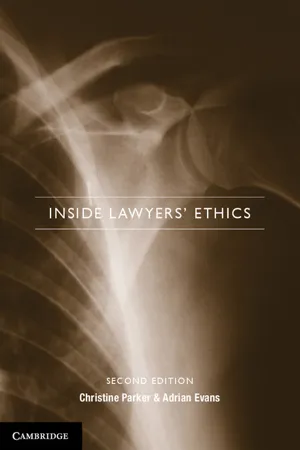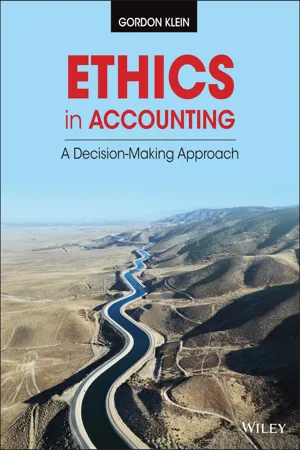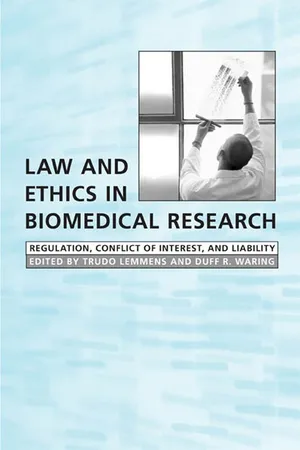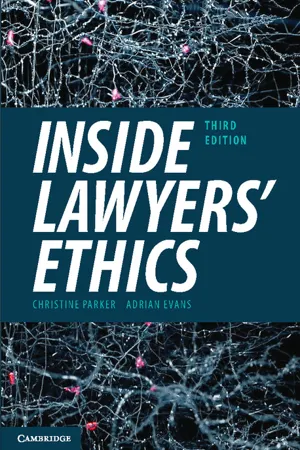Law
Competing Interests
Competing interests refer to situations where individuals or entities have conflicting interests or obligations that may impact their decision-making or actions. In the legal context, it often pertains to situations where a person's personal interests may conflict with their professional duties or responsibilities, potentially leading to ethical or legal challenges.
Written by Perlego with AI-assistance
Related key terms
1 of 5
10 Key excerpts on "Competing Interests"
- Anne Peters, Lukas Handschin(Authors)
- 2012(Publication Date)
- Cambridge University Press(Publisher)
2. Conflict of interest: an elusive concept ‘Conflict of interest’ as a legal term is much younger than the idea it expresses. The old adage that one cannot serve two masters describes one particular type of conflict of interest (arising out of a plurality of principals). In the judicial sphere, the requirements of independence and impartiality of the judiciary are traditional concepts for managing conflict of interest in the person of the judge. Nemo judex in re sua, no one should be a judge in his own cause, is an ancient principle which expresses this idea. Likewise, the term ‘capture’, when speaking of ‘regulatory capture’ or of ‘ richterliche Befangenheit’ (‘judicial capture’), conveys the image of a rule-maker or a decision-maker being caught by certain interest groups. Conflict of interest has been defined as ‘a situation in which some interest of a person has a tendency to interfere with the proper exercise of his judgement in another’s behalf’. 1 The concept of conflict of interest in that 1 Michael Davis, ‘Conflict of Interest’, p. 589. See on the notion of interest, p. 20 below. 4 anne peters sense relates to situations of decision-making with a practical relevance, such as a court’s or tribunal’s deliberation and adoption of a judgment, administrative activity, decisions of a board of directors of a corporation, medical decisions of a doctor, or even of surrogate decision-makers for comatose patients who lack decisional capacity. 2 So the conflict we are dealing with is an intrapersonal conflict arising within a human or an institution which is entrusted with such decision-making. It is not a clash between different actors. 3 Additionally, and most importantly, it is submitted here that a conflict of interest is not per se present when a professional or official decision- maker is required to take into account various, often antagonist, inter- ests of different sectors of society.- eBook - ePub
Scientific Integrity
Text and Cases in Responsible Conduct of Research
- Francis L. Macrina(Author)
- 2014(Publication Date)
- ASM Press(Publisher)
chapter 7Competing Interests in ResearchS. Gaylen BradleyIntroduction • Conflict of Effort • Conflict of Conscience • Conflict of Interest • Managing Competing Interests • Conclusion • Discussion Questions • Case Studies • ResourcesIntroduction
As in any profession, scientists encounter situations in which financial or various other personal considerations come into competition with one another or with the interests of their employers. This competition may create an untoward conflict that may compromise or appear to compromise the judgment of the scientist. Improperly managed Competing Interests may bias or have an inappropriate impact on proposing or performing research, reviewing research, reporting research results, or participating in research training.These Competing Interests are frequently labeled “conflicts of interest.” Legally, this phrase is used to cover a broad spectrum of situations all of which are characterized by the possibility of receiving something of financial or personal value that, in turn, may introduce bias or corrupt the judgment of the scientist. Some federal funding agencies have sought to clarify this terminology, using the phrase “financial conflict of interest.” Competing Interests also extend beyond the sphere of direct financial gain, and scientists must be aware of and deal with the dilemmas that such situations create. These fall into two additional areas called “conflict of effort” and “conflict of conscience.”Competing Interests permeate the science enterprise and must be addressed to ensure the responsible conduct of research. Rule makers usually expand guidelines and regulations to preserve the integrity of the scientific record and the trust of those who utilize the product of science to include the appearance or perception of private or personal interests that might compromise objective judgment and professional practice. Governmental agencies have enacted laws and promulgated rules in order to reassure the sponsors of research and the consumers of scientific results that the data, interpretations, and recommendations are free of bias. These laws and rules constitute the framework within which science operates. Various constituencies of the scientific community may set higher or more restrictive standards than the mandated minimal standard of conduct. The legal framework that governs conflicts of interest focuses primarily on financial conflicts of interest, although competition for prestige may equally influence the decisions of a scientist. Conflict of interest is not derived from moral intuition but is a relatively recent ethical category, having been introduced in the 1930s and first appearing in a court decision in 1949. The scope of conflict of interest is still evolving, and it is a situation in which all scientists are enmeshed. There is a pervasive, innocent view that all conflicts of interest must be avoided or eliminated in science, a so-called zero tolerance level. Having a conflict of interest does not mean a lack of integrity nor constitute corruption, but it requires actions to maintain trust and confidence that the scientific record and practice are reliable. Each dilemma has unique elements, and one size does not fit all in identifying, minimizing, and governing potential breaches in research integrity. - eBook - PDF
The Good Lawyer
A Student Guide to Law and Ethics
- Adrian Evans(Author)
- 2014(Publication Date)
- Cambridge University Press(Publisher)
Chapter 7 CONFLICTS OF LOYALTY AND INTEREST 7.1 Introduction: What is a conflict of interest and why are conflicts so difficult? Consider this vignette, which is constructed from a number of decided cases. Documents, faxes, emails and drinks You are working in a merger team on the 4th floor of a large transnational law firm. Your client is Emirates Airways, which has proposed a merger with QANTAS, now that their code share alliance is succeeding. On the 3rd floor, another team from your firm is working for QANTAS on the same issue. QANTAS is struggling financially, but both airlines have developed some con- fidence in each other and think they can save some legal costs by using just the one law firm – yours. The firm’s email system blocks the access of either team to emails from the other team, so that both teams can work independently of each other. But early one morning an email is copied to you from someone you think you remember meeting the previous evening at the firm’s cocktails event, which was held to celebrate the merger deal. You do not have any clear memory of the evening or what was said, but the email contains vague references to a financial problem in QANTAS, which seems to have debts that you know Emirates is not aware of. The author of the mail is proposing a 3rd floor meeting to discuss how this debt issue will be handled. You are immediately concerned. What should you do with the email? 155 A conflict of interest is a significant problem for all professionals, but especially for a lawyer. We must act only in the interests of those who entrust us with their secrets. The general idea is that we act for only one client at a time, so that we avoid a conflict of interest. - eBook - PDF
Serving Two Masters
Conflicts of Interest in the Modern Law Firm
- Janine E. Griffiths-Baker(Author)
- 2002(Publication Date)
- Hart Publishing(Publisher)
Conflicts of Interest: An International Perspective 79 23 Ibid , at pp 31 to 32. Note 7 prohibits representation of opposing parties in litigation and note 112 prevents a lawyer from representing multiple parties to a negotiation if their interests are fun-damentally antagonistic to each other, pp 33 to 34. 24 Ibid. 25 See Kelly v Cooper , Above at 48. 26 FC Zacharias, ‘Waiving Conflicts of Interest’, (1998) 108 The Yale Law Journal 407 at 408. See also, PR Jarvis and B Tellam, ‘When Waiver Should not be Good Enough: An Analysis of Current Client Conflicts Law’, (1997) 33 Willamette Law Review , 145; L Moore, ‘Conflicts of Interest in the Simultaneous Representation of Multiple Clients: A Proposed Solution to the Current Confusion and Controversy’, (1982) 61 Texas Law Review 211. 27 FC Zacharias, ‘Rethinking Confidentiality’, (1989) 74 Iowa Law Review 351 at pp 416–23. A further issue, which has not been specifically identified by commentators, is that no recommendations are made as to how best to protect the interests of two clients where a firm is representing both in the same matter. No guidance is given, for example, on the desirability of establishing separate teams of fee-earners. Therefore, where the clients concerned are on the same side in a joint action, but where their interests are nonetheless potentially at odds, a lawyer or firm may represent these two or more clients without taking any protective measures, provided that both clients give their consent to such action. 28 The attitude of the ABA to other types of conflict is not as straightforward. In general a much stricter approach has been adopted. This can be seen, for exam-ple, in relation to lawyers who practise in association with other lawyers. - eBook - PDF
License to Drill
A Manual on Integrity Due Diligence for Licensing in Extractive Sectors
- Cari L. Votava, Jeanne M. Hauch, Francesco Clementucci(Authors)
- 2018(Publication Date)
- World Bank(Publisher)
Higher standards in terms of conflicts of interest are often applied to critical integrity agencies and officials—for example, to judiciary and law enforcement officials, in light of the importance of ensuring high integrity stan-dards and the potential risk and serious consequences where integrity standards are eroded or even perceived to be weak. Next, policy makers must choose a definition of conflict of interest and enact that definition in binding laws or regulations. A number of countries have devel-oped codes of conduct or ethics for specific sectors and government service functions that may be useful. For example, the United Kingdom recently updated Conflicts of Interest | 71 its regulations on public procurement with guidance on combating corruption and preventing conflicts of interest. It defines a conflict of interest as “any situa-tion where relevant staff members have, directly or indirectly, a financial, eco-nomic or other personal interest which might be perceived to compromise their impartiality and independence in the context of the concession contract award procedure.” 8 Similarly, it may be useful to define prohibited conflicts of interest in language such as: Agency personnel should be prohibited from any involvement in deci-sions concerning applications from persons to whom they are related (by family ties, business ties, or other strong bonds, including relationships to legal persons). Whatever the exact policy, it should be applied with fairness and clarity. Good practice safeguards in preventing abuse of discretion include requiring that discretionary decisions (1) be articulated in a text that summarizes the factors, analysis, and justification on which the decision is based and (2) be subjected to review and signature approval by at least two levels of officials. The agency may wish to have a mechanism to receive COI complaints from outside parties. - No longer available |Learn more
Informal Relations from Democratic Representation to Corruption
Case studies from Central and Eastern Europe
- Zdenka Mansfeldová, Heiko Pleines, Zdenka Mansfeldová, Heiko Pleines(Authors)
- 2012(Publication Date)
- Ibidem Press(Publisher)
Piotr Stankiewicz and Stanislaw Burdziej 3. Conflict of Interest as a Research-Analytical Category 3.1. Introduction Contrary to common understanding, a conflict of interest (COI) is not a situation in which two different actors have conflicting interests. According to one of the best-known definitions, offered by Michael Davis, [a] conflict of interest is a situation in which some person P (whether an individual or cor-porate body) stands in a certain relation to one or more decisions. On the standard view, P has a conflict of interest if, and only if, (1) P is in a relationship with another requiring P to exercise judgment in the other’s behalf and (2) P has a (special) interest tending to interfere with the proper exercise of judgment in that relationship. 1 More succinctly, Nobel Prize-winning economist George J. Stigler defines COI as aris-ing ‘whenever one man is an agent for another’. 2 Put differently, whenever one per-son or institution is charged with acting in the interest of another party, the tempta-tion to pursue private or third party interests will emerge. COI can thus arise when-ever people are forced to trust each other, and trust can always be violated. It is also possible to think of COI as a situation of ‘double loyalty’, whereby one ‘should pursue goals which in the given circumstances cannot be achieved simultaneously’. 3 The aim of this article is to offer a critical review of the concept of COI, prima-rily as it is understood and applied in the field of legal studies. We argue that when couched in strictly legal terms, COI loses much of its power and promise as a research-analytical category. A more nuanced, sociological view would broaden the concep-tual scope and help to uncover obvious and potentially destructive conflicts of inter-est that the narrow legal definition would fail to detect. In this vein, we try to estab-lish a link between COI and the phenomena of corruption, nepotism, illegal lobbying and the revolving-door syndrome. - eBook - PDF
- Christine Parker, Adrian Evans(Authors)
- 2013(Publication Date)
- Cambridge University Press(Publisher)
It is often in these situations, where we do not feel we have made an ethical choice at all – we have simply allowed a situation to carry us along – that our actions end up having consequences that we did not expect. We might end up in losing valued clients, having our reputation questioned by colleagues, even facing disciplinary action or ridicule in the media. A conscious choice to know and understand our values base will produce consequences that are, at least, anticipated and, it is to be hoped, defendable and desirable within an ethical and satisfying legal practice. RECOMMENDED FURTHER READING G E Dal Pont, Lawyers’ Professional Responsibility (Lawbook Co, Pyrmont, NSW, 5th edn, 2013) ‘Part II: Lawyers’ Duty to the Client’, especially Chapters 6, 7 and 8. Adrian Evans, ‘A Mutuality of Interest’ (2003) 77(7) Law Institute Journal 86. —— ‘Concurrent Loyalties’ (2004) 78(6) Law Institute Journal 82. Janine Griffiths-Baker, Serving Two Masters: Conflicts of Interest in the Modern Law Firm (Hart Publishing, Oxford, 2002). Law Society of New South Wales in consultation with the Law Institute of Victoria, Information Barrier Guidelines (2006) Law Society of New South Wales at 2 June 2006. Donald Nicolson and Julian Webb, Professional Legal Ethics: Critical Interrogations (Oxford University Press, Oxford, 1999) ‘Ch 9: Confidentiality’ 253–76. Richard Tur, ‘Confidentiality and Accountability’ (1992) 1 Griffith Law Review 73. Duncan Webb, ‘Autonomy, Paternalism, and Institutional Interest: Why Some Conflicts Can’t Be Waived’ (2005) 12 International Journal of the Legal Profession 261. - eBook - PDF
Ethics in Accounting
A Decision-Making Approach
- Gordon Klein(Author)
- 2015(Publication Date)
- Wiley(Publisher)
However, the notion of an interest extends well beyond a monetary goal or desire. As one example, an interest might be a personal allegiance to a family member or friend. For instance, assume that an accountant employed by a debt collection agency dis- covers that his company’s actions might cause an unemployed friend to lose her house in foreclosure. A conflict of interest may well exist because the company’s goal of collecting an outstanding loan might run counter to the accountant’s interest in aiding her friend’s welfare. As another example, an interest might be an accountant’s goal of promoting the goals of a particular charitable, civic, or social cause. To illustrate, assume that your client, a health insurance company, hopes to avoid paying for an expensive new diabetes treatment. As a result, this client has asked you to advocate to regulators that the costs of this treatment far exceed its benefits. If one of your close relatives lost his eyesight due to diabetes, your emotional commitment to public policies that improve diabetes care might preclude you from aggressively promoting your client’s interests. Example 11-8 You currently serve as a paid financial consultant to the Board of Directors of a local church-affiliated high school. Due to recent funding cutbacks, the Board of Directors has asked you for advice about whether it should decrease the size of its student body. Your younger brother soon will be applying for admission to this highly selective high school. He is worried that his academic record is “probably borderline” for being admitted. Do you have a conflict of interest in rendering advice to the school? Solution Yes. Because you would like to improve your brother’s odds of being admitted to this school, your have a personal interest in the school maintaining its current enrollment levels. However, this personal goal compromises your ability to give the school objective advice about its optimal enrollment levels. - eBook - PDF
- Trudo Lemmens, Duff Waring(Authors)
- 2017(Publication Date)
- University of Toronto Press(Publisher)
4 The Ethical and Legal Foundations of Scientific ‘Conflict of Interest’ sheldon krimsky ‘Conflict of interest’ is embedded in many areas of public ethics. Cer-tain enactments named for their ethical content, such as the U.S. Ethics in Government Act , have sections devoted to ‘conflict of interest,’ and the legal community, government officials, financial organizations, and many news organizations have strict guidelines on such conflict. Yet the term is rather new to the scientific and medical research communi-ties. Prior to 1980 little public attention was given to scientists with Competing Interests in their research. The first medical journal to intro-duce a conflict of interest disclosure requirement was the New England Journal of Medicine in 1984, followed a year later by the Journal of the American Medical Association. 1 One might ask whether conflicts of interest among scientists should be treated differently than they are in other professions. Why, more-over, did the concern about conflicts of interest arise so much later among scientists, compared to public policy and law? This chapter explores the ethical and legal foundations of conflict of interest (COI) in the sciences and asks whether COI among scientists, in contrast to other professions, represents an ethical problem. Science and Ethics Conflict of interest in science and medicine has been defined as a set of conditions in which professional judgment concerning a primary inter-est (i.e., integrity of research) tends to be adversely influenced by a secondary interest (i.e., financial gain). 2 There are two possible expla-nations for why the issue of conflict of interest arose late among the scientific professions: (1) scientists were believed to operate within a - eBook - PDF
- Christine Parker, Adrian Evans(Authors)
- 2018(Publication Date)
- Cambridge University Press(Publisher)
Chapter 7: Conflicting loyalties 229 avoid conflicts of interest is to avoid the need to make such mental contortions in the first place. Justice Cummins of the Supreme Court of Victoria has commented at an ethics seminar: What bedevils the prohibition of a conflict of interest is a confusion of purposes. The purpose of prohibition of conflict of interest is not to remedy an offence or a failure. The purpose of prohibition of conflict of interest is to prevent an offence or a failure. Prohibition of conflict operates upstream of offence or failure. It is preventative. It is prophylactic. Thus it is no answer to breach of conflict to say that in fact no harm occurred, that the client was not harmed. If harm, a loss, a failure, an offence occurred, you would be dealt with for a consequential matter. Prohibition of conflict is an antece- dent matter. That also is why the phrase ‘potential conflict of interest’ is tautologous. 18 The last part of ASCR r 11, subsection 11.5, expressly permits the existence of a potential conflict inside the regime of ASCR rr 11.3 and 11.4 and only requires a lawyer to withdraw if that conflict becomes an ‘actual’ conflict. But prevention of conflict in the sense identified by Justice Cummins is not the Law Council’s priority. The subsection seems to assume that both clients will be willing to agree to just so much loyalty – or agree to tolerate as much infidelity – as may be necessary for them to enjoy access to the same lawyer. But why is it felt necessary at all to endorse joint representation of two clients involved in the same matter? ASCR 11.
Index pages curate the most relevant extracts from our library of academic textbooks. They’ve been created using an in-house natural language model (NLM), each adding context and meaning to key research topics.
